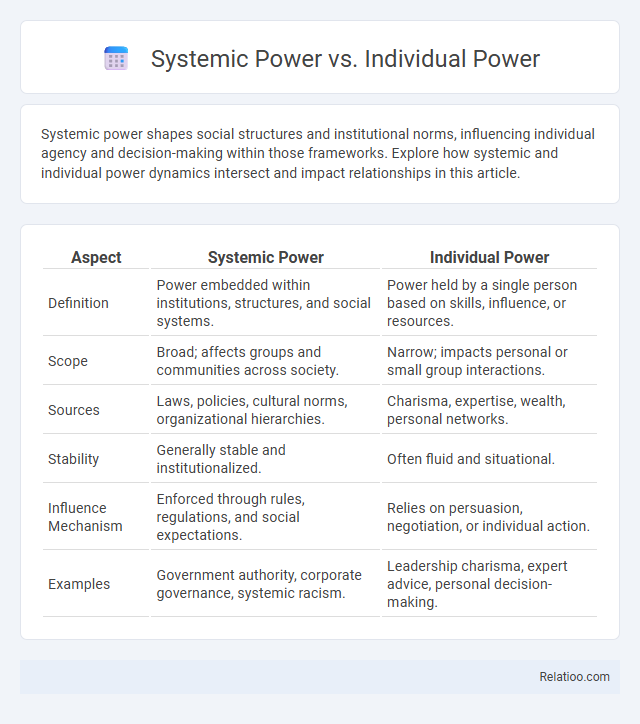Systemic power shapes social structures and institutional norms, influencing individual agency and decision-making within those frameworks. Explore how systemic and individual power dynamics intersect and impact relationships in this article.
Table of Comparison
| Aspect | Systemic Power | Individual Power |
|---|---|---|
| Definition | Power embedded within institutions, structures, and social systems. | Power held by a single person based on skills, influence, or resources. |
| Scope | Broad; affects groups and communities across society. | Narrow; impacts personal or small group interactions. |
| Sources | Laws, policies, cultural norms, organizational hierarchies. | Charisma, expertise, wealth, personal networks. |
| Stability | Generally stable and institutionalized. | Often fluid and situational. |
| Influence Mechanism | Enforced through rules, regulations, and social expectations. | Relies on persuasion, negotiation, or individual action. |
| Examples | Government authority, corporate governance, systemic racism. | Leadership charisma, expert advice, personal decision-making. |
Understanding Systemic Power: Definitions and Examples
Systemic power refers to the structured and institutionalized control embedded within societal systems such as governments, corporations, and legal frameworks, influencing resources, opportunities, and social norms on a broad scale. Individual power is the capacity of a single person to effect change or make decisions, often limited by the overarching systemic forces at play. Marginalization occurs when groups or individuals are excluded or disadvantaged within these systems, highlighting the imbalance between systemic power and personal agency that you must understand to navigate social dynamics effectively.
The Nature of Individual Power
Individual power manifests through personal agency, decision-making autonomy, and the ability to influence one's environment despite systemic constraints. It is shaped by factors such as self-efficacy, access to resources, and social capital, allowing individuals to negotiate power dynamics within wider social structures. While often limited by systemic power and marginalization, individual power can drive change by challenging existing hierarchies and initiating grassroots movements.
Historical Contexts: Systemic Power Through Time
Systemic power has historically manifested through institutions such as governments, legal systems, and economic structures that entrench dominance and shape social hierarchies over centuries. Colonialism, slavery, and apartheid exemplify systemic power enforcing racial and ethnic marginalization, while gendered laws and cultural norms institutionalized disparities between men and women. Individual power, although impactful, often operates within or against these entrenched systems, highlighting the persistent challenges marginalized groups face in achieving equity.
How Systems Shape Individual Agency
Systems of systemic power structure societal norms, laws, and economic conditions that either constrain or enable individual agency within marginalized groups. Institutional frameworks often perpetuate marginalization by limiting access to resources, political representation, and social mobility, thereby reinforcing power imbalances. Individual power is shaped by the degree to which systemic forces allow for autonomy, participation, and the capacity to challenge oppression.
The Interaction Between Systemic and Individual Power
Systemic power shapes the frameworks and institutions that influence individual actions and societal norms, while individual power reflects a person's ability to impact their environment and make choices within these constraints. The interaction between systemic and individual power determines how marginalization occurs, as systemic inequalities limit the agency of marginalized individuals and groups. Understanding this dynamic helps you recognize the barriers to equity and the potential for both structural reform and personal empowerment.
Barriers to Individual Power Within Systems
Systemic power creates structural barriers that limit your individual power by embedding inequalities in institutions, policies, and social norms. These barriers include restricted access to resources, exclusion from decision-making processes, and reinforcement of marginalization through discriminatory laws or cultural biases. Overcoming these obstacles requires recognizing how systemic power shapes opportunities and actively working to dismantle mechanisms that sustain oppression and disempowerment.
Strategies for Challenging Systemic Power
Challenging systemic power requires strategic collective action that centers marginalized voices and dismantles institutional barriers perpetuating inequality. Empowering individuals through education, grassroots organizing, and coalition-building amplifies resistance against oppressive structures. Advocacy for policy reform and accountability mechanisms addresses systemic power imbalances and promotes social justice.
Amplifying Individual Voices in Systemic Structures
Systemic power shapes societal norms and institutional frameworks that often marginalize individual voices, limiting their influence on policy and decision-making processes. Amplifying individual voices within these structures requires strategic engagement through advocacy, inclusive platforms, and grassroots mobilization to challenge entrenched inequalities. Empowering marginalized individuals fosters collective agency, enabling transformational shifts in systemic dynamics toward equity and social justice.
Case Studies: Individuals Impacting Systemic Change
Case studies reveal how individual power can challenge systemic power structures, highlighting Your role in driving transformative social change despite marginalization. Examples include activists who leverage personal experiences to expose institutional inequality, thereby influencing policy reform and cultural shifts at macro levels. Understanding these dynamics is crucial for empowering marginalized voices to disrupt entrenched systems of oppression and foster inclusive progress.
Building Equitable Systems: Balancing Power Dynamics
Building equitable systems requires addressing systemic power structures that perpetuate inequality by concentrating control within dominant groups and institutions. Individual power, while significant, must be understood in relation to these larger frameworks, ensuring marginalized voices are amplified rather than overshadowed by entrenched hierarchies. Balancing power dynamics involves dismantling barriers created by systemic power and fostering inclusive, participatory environments that promote fairness and access for all communities.

Infographic: Systemic Power vs Individual Power
 relatioo.com
relatioo.com